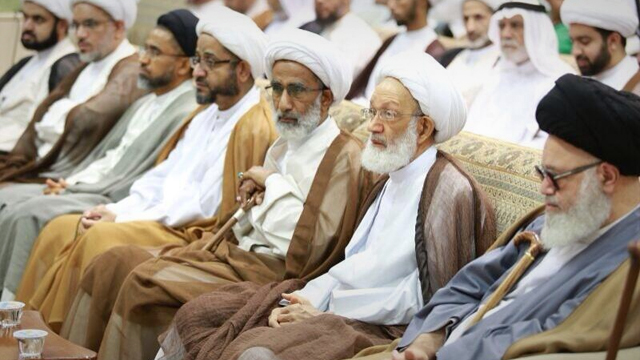
RNA – A group of Bahraini Shi’a scholars have issued a statement responding to the claim by the Kingdom’s Prosecutor General that a recently-passed law doesn’t target the khums tax paid by Shi’a Muslims.
Senior scholars warned against any attempt by the Al Khalifah regime to target Bahrain majority Shi’a population by undermining the one-fifth khums tax, a pillar of their creed, following reports that authorities were investigating funds held by Bahrain’s top Shi’a cleric, Ayatollah Isa Qasim.
In their statement, the scholars said the defense attorney or the public prosecutor has proved that they are ignorant of the obligation of khums or they have ignored it. “How is it possible that the regime gave itself permission to issue a ruling on whether this issue is related to their allegation or not when they haven’t understood even one letter of khums?” they said.
They added that Ayatollah Qasim did not call on his supporters to pay the khums in any speech in his mosque, office or in any other place but rather, the laws of khums state that a Shi’a Muslim believer is required to pay his khums to the person or persons that the sources of emulation have chosen with certainty according to the conditions and specialities of Islamic law.
Ayatollah Isa Qasim a trusted source of emulation
They stressed that Ayatollah Qasim is the most prominent of those who have the legal conditions to receive the khums funds from the faithful and distribute it to needy beneficiaries. “His Eminence has been able to obtain the trust of the other sources of emulation and the believers with his piety, righteousness, integrity and compassion in order to fulfill this duty on the basis of Islamic law,” they said.
The group of Bahraini Shi’a scholars explained that the Al Khalifah’s accusation that Ayatollah Qasim is collecting illegal funds without permission is completely invalid because these funds are accepted based on religious obligation and are distributed to those who require such funds based on religious law.
They added that those who receive the money are not considered as “collectors” by convention or Islamic law but rather, these funds have been designated by a holy Islamic legislator and one does not require permission from others to receive or distribute them.
Other bloodthirsty rulers have never launched such a campaign against khums
The Bahrain scholars pointed out that just like prayer, permission for receiving and distributing khums from others is not possible and added that the regime’s claim that the sources of these funds are unknown is also a lie because the source is clearly determined and is based on a legal statute whereby a believer pays one-fifth of his property to the representative of the source of emulation which he follows. The receipt and distribution of khums funds is in no way affiliated with state laws and their inclusion in these laws is illegitimate.
In conclusion, the statement states that Shi’as across the world will fulfill this obligation in front of the eyes of the government and even bloody and repressive regimes do not show the same reaction.
“Even Iraqi dictator Saddam [Husayn] did not interfere in the receiving and distribution of khums and it was carried out publicly in Najaf and throughout Iraq because it is a source of good for society, especially the poor and disadvantaged,” they said.
111/112